Business Law Report: UK Legal System, Business Impact and Laws
VerifiedAdded on 2021/01/02
|15
|5246
|466
Report
AI Summary
This report provides a comprehensive overview of UK business law, encompassing the legal systems and their impact on various aspects of businesses. It begins with an introduction to business law, defining its scope and significance in regulating commercial activities. The report then delves into the meaning of parliamentary sovereignty and explores the sources of UK law, differentiating between primary and secondary sources, including case law, legislation, and European directives. The role of the government in the UK law-making process is examined, along with the applicability of statutory and common law in justice courts. The report further illustrates the impact of company, employment, and contract law on businesses, differentiating between legislation, regulations, and standards. Case studies are included to provide practical examples of legal issues and solutions within the business context. The report concludes with a summary of the key findings and recommendations for businesses to navigate the legal landscape effectively. This report is contributed by a student to be published on the website Desklib, a platform which provides all the necessary AI based study tools for students.

Business Law
Paraphrase This Document
Need a fresh take? Get an instant paraphrase of this document with our AI Paraphraser
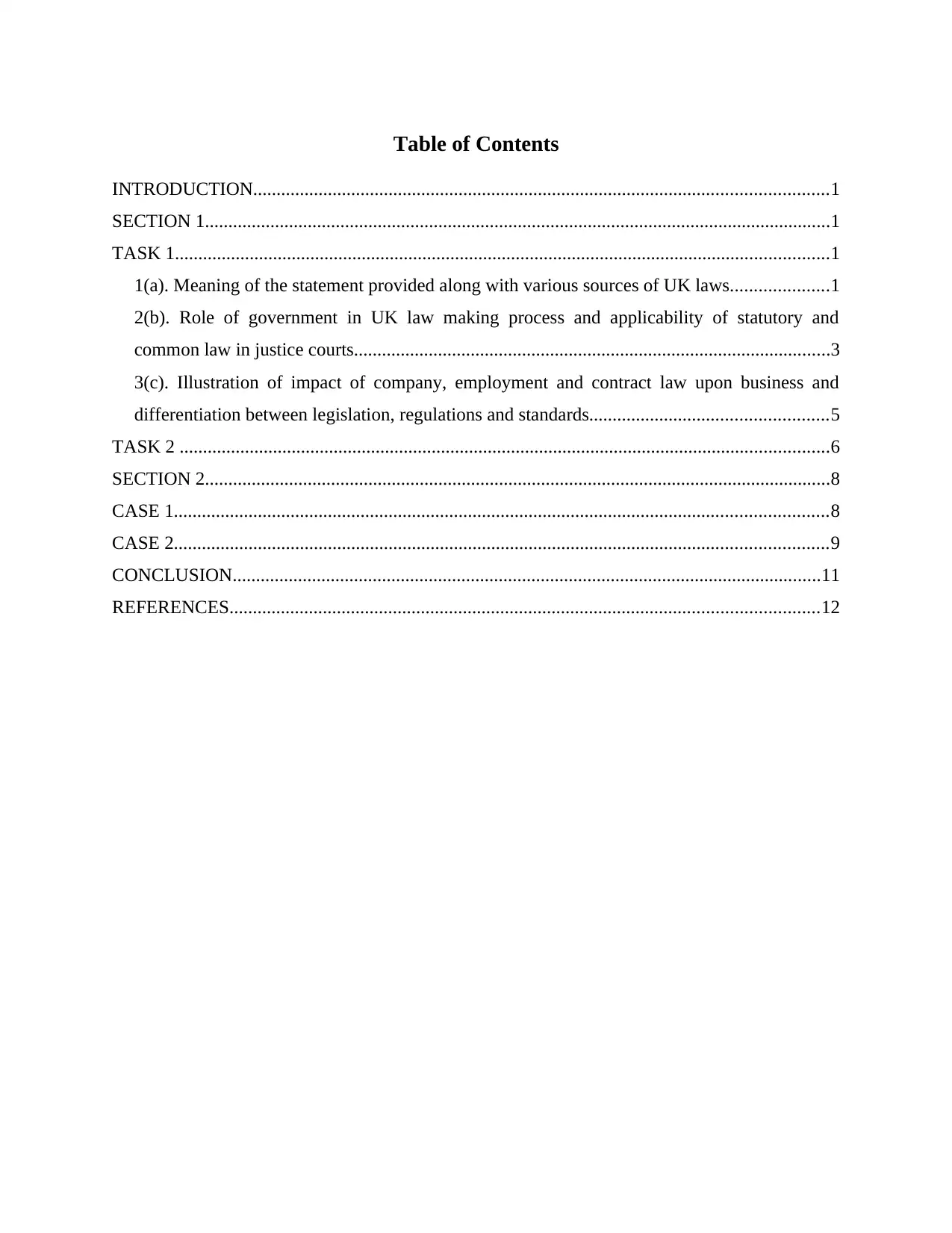
Table of Contents
INTRODUCTION...........................................................................................................................1
SECTION 1......................................................................................................................................1
TASK 1............................................................................................................................................1
1(a). Meaning of the statement provided along with various sources of UK laws.....................1
2(b). Role of government in UK law making process and applicability of statutory and
common law in justice courts......................................................................................................3
3(c). Illustration of impact of company, employment and contract law upon business and
differentiation between legislation, regulations and standards...................................................5
TASK 2 ...........................................................................................................................................6
SECTION 2......................................................................................................................................8
CASE 1............................................................................................................................................8
CASE 2............................................................................................................................................9
CONCLUSION..............................................................................................................................11
REFERENCES..............................................................................................................................12
INTRODUCTION...........................................................................................................................1
SECTION 1......................................................................................................................................1
TASK 1............................................................................................................................................1
1(a). Meaning of the statement provided along with various sources of UK laws.....................1
2(b). Role of government in UK law making process and applicability of statutory and
common law in justice courts......................................................................................................3
3(c). Illustration of impact of company, employment and contract law upon business and
differentiation between legislation, regulations and standards...................................................5
TASK 2 ...........................................................................................................................................6
SECTION 2......................................................................................................................................8
CASE 1............................................................................................................................................8
CASE 2............................................................................................................................................9
CONCLUSION..............................................................................................................................11
REFERENCES..............................................................................................................................12
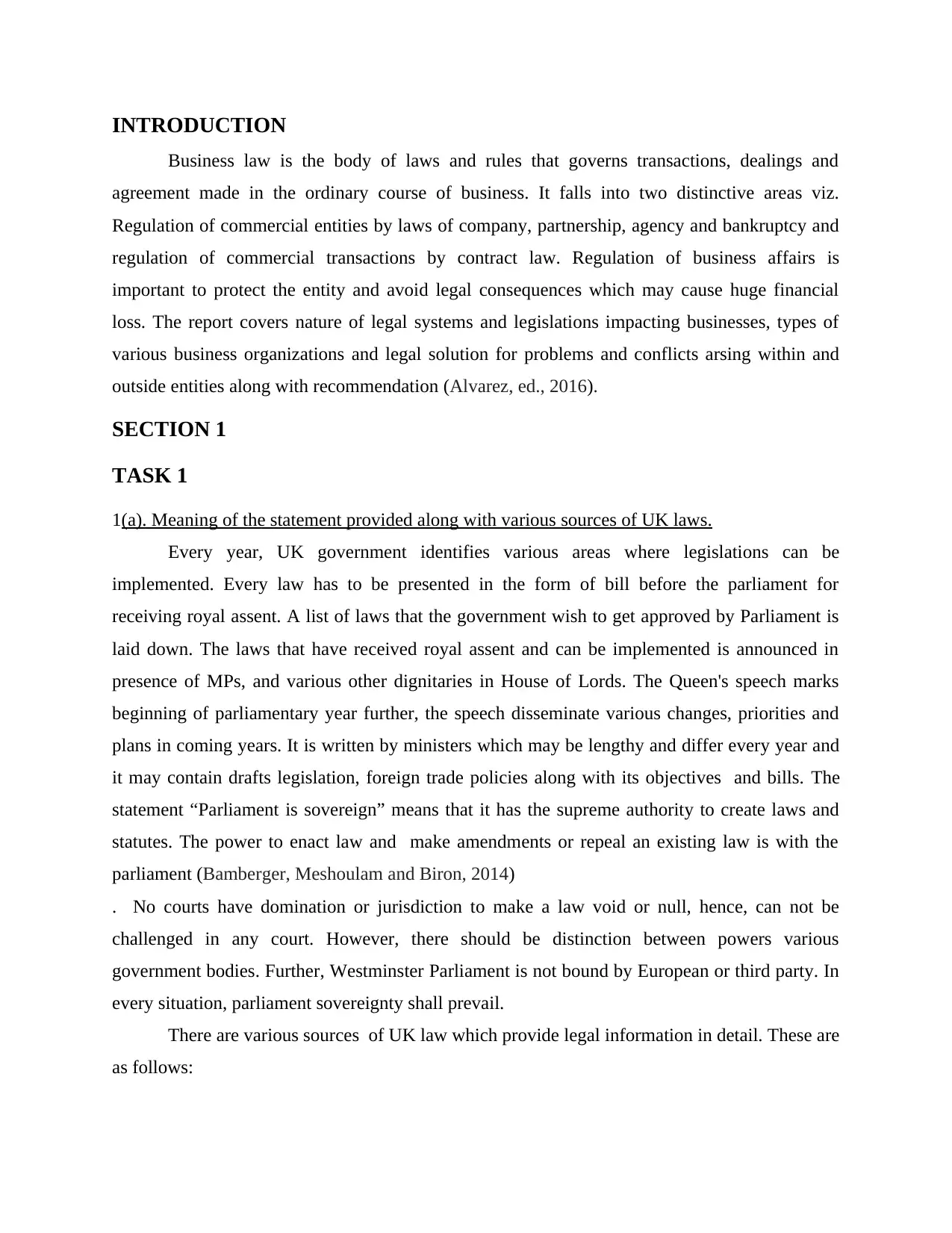
INTRODUCTION
Business law is the body of laws and rules that governs transactions, dealings and
agreement made in the ordinary course of business. It falls into two distinctive areas viz.
Regulation of commercial entities by laws of company, partnership, agency and bankruptcy and
regulation of commercial transactions by contract law. Regulation of business affairs is
important to protect the entity and avoid legal consequences which may cause huge financial
loss. The report covers nature of legal systems and legislations impacting businesses, types of
various business organizations and legal solution for problems and conflicts arsing within and
outside entities along with recommendation (Alvarez, ed., 2016).
SECTION 1
TASK 1
1(a). Meaning of the statement provided along with various sources of UK laws.
Every year, UK government identifies various areas where legislations can be
implemented. Every law has to be presented in the form of bill before the parliament for
receiving royal assent. A list of laws that the government wish to get approved by Parliament is
laid down. The laws that have received royal assent and can be implemented is announced in
presence of MPs, and various other dignitaries in House of Lords. The Queen's speech marks
beginning of parliamentary year further, the speech disseminate various changes, priorities and
plans in coming years. It is written by ministers which may be lengthy and differ every year and
it may contain drafts legislation, foreign trade policies along with its objectives and bills. The
statement “Parliament is sovereign” means that it has the supreme authority to create laws and
statutes. The power to enact law and make amendments or repeal an existing law is with the
parliament (Bamberger, Meshoulam and Biron, 2014)
. No courts have domination or jurisdiction to make a law void or null, hence, can not be
challenged in any court. However, there should be distinction between powers various
government bodies. Further, Westminster Parliament is not bound by European or third party. In
every situation, parliament sovereignty shall prevail.
There are various sources of UK law which provide legal information in detail. These are
as follows:
Business law is the body of laws and rules that governs transactions, dealings and
agreement made in the ordinary course of business. It falls into two distinctive areas viz.
Regulation of commercial entities by laws of company, partnership, agency and bankruptcy and
regulation of commercial transactions by contract law. Regulation of business affairs is
important to protect the entity and avoid legal consequences which may cause huge financial
loss. The report covers nature of legal systems and legislations impacting businesses, types of
various business organizations and legal solution for problems and conflicts arsing within and
outside entities along with recommendation (Alvarez, ed., 2016).
SECTION 1
TASK 1
1(a). Meaning of the statement provided along with various sources of UK laws.
Every year, UK government identifies various areas where legislations can be
implemented. Every law has to be presented in the form of bill before the parliament for
receiving royal assent. A list of laws that the government wish to get approved by Parliament is
laid down. The laws that have received royal assent and can be implemented is announced in
presence of MPs, and various other dignitaries in House of Lords. The Queen's speech marks
beginning of parliamentary year further, the speech disseminate various changes, priorities and
plans in coming years. It is written by ministers which may be lengthy and differ every year and
it may contain drafts legislation, foreign trade policies along with its objectives and bills. The
statement “Parliament is sovereign” means that it has the supreme authority to create laws and
statutes. The power to enact law and make amendments or repeal an existing law is with the
parliament (Bamberger, Meshoulam and Biron, 2014)
. No courts have domination or jurisdiction to make a law void or null, hence, can not be
challenged in any court. However, there should be distinction between powers various
government bodies. Further, Westminster Parliament is not bound by European or third party. In
every situation, parliament sovereignty shall prevail.
There are various sources of UK law which provide legal information in detail. These are
as follows:
⊘ This is a preview!⊘
Do you want full access?
Subscribe today to unlock all pages.

Trusted by 1+ million students worldwide
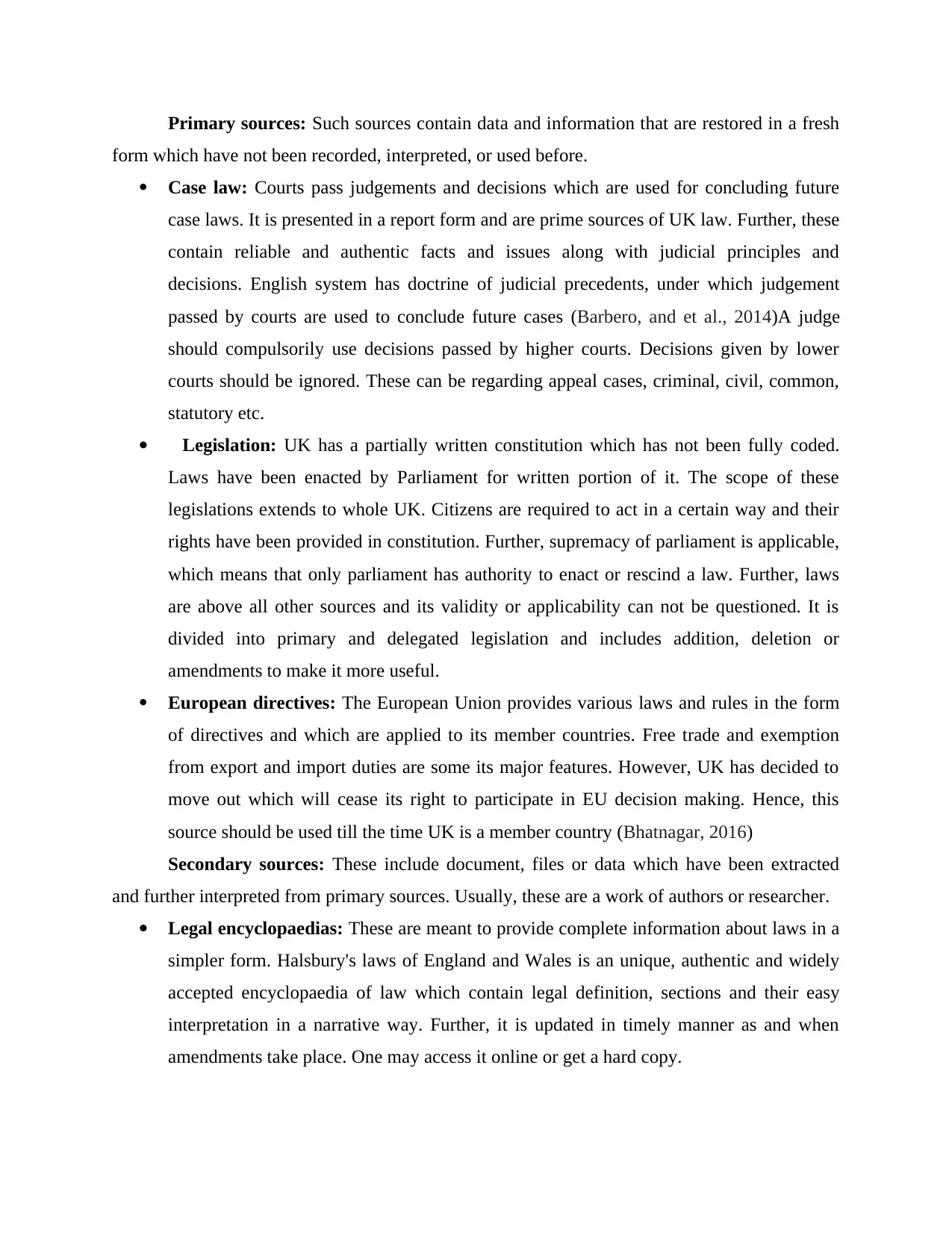
Primary sources: Such sources contain data and information that are restored in a fresh
form which have not been recorded, interpreted, or used before.
Case law: Courts pass judgements and decisions which are used for concluding future
case laws. It is presented in a report form and are prime sources of UK law. Further, these
contain reliable and authentic facts and issues along with judicial principles and
decisions. English system has doctrine of judicial precedents, under which judgement
passed by courts are used to conclude future cases (Barbero, and et al., 2014)A judge
should compulsorily use decisions passed by higher courts. Decisions given by lower
courts should be ignored. These can be regarding appeal cases, criminal, civil, common,
statutory etc.
Legislation: UK has a partially written constitution which has not been fully coded.
Laws have been enacted by Parliament for written portion of it. The scope of these
legislations extends to whole UK. Citizens are required to act in a certain way and their
rights have been provided in constitution. Further, supremacy of parliament is applicable,
which means that only parliament has authority to enact or rescind a law. Further, laws
are above all other sources and its validity or applicability can not be questioned. It is
divided into primary and delegated legislation and includes addition, deletion or
amendments to make it more useful.
European directives: The European Union provides various laws and rules in the form
of directives and which are applied to its member countries. Free trade and exemption
from export and import duties are some its major features. However, UK has decided to
move out which will cease its right to participate in EU decision making. Hence, this
source should be used till the time UK is a member country (Bhatnagar, 2016)
Secondary sources: These include document, files or data which have been extracted
and further interpreted from primary sources. Usually, these are a work of authors or researcher.
Legal encyclopaedias: These are meant to provide complete information about laws in a
simpler form. Halsbury's laws of England and Wales is an unique, authentic and widely
accepted encyclopaedia of law which contain legal definition, sections and their easy
interpretation in a narrative way. Further, it is updated in timely manner as and when
amendments take place. One may access it online or get a hard copy.
form which have not been recorded, interpreted, or used before.
Case law: Courts pass judgements and decisions which are used for concluding future
case laws. It is presented in a report form and are prime sources of UK law. Further, these
contain reliable and authentic facts and issues along with judicial principles and
decisions. English system has doctrine of judicial precedents, under which judgement
passed by courts are used to conclude future cases (Barbero, and et al., 2014)A judge
should compulsorily use decisions passed by higher courts. Decisions given by lower
courts should be ignored. These can be regarding appeal cases, criminal, civil, common,
statutory etc.
Legislation: UK has a partially written constitution which has not been fully coded.
Laws have been enacted by Parliament for written portion of it. The scope of these
legislations extends to whole UK. Citizens are required to act in a certain way and their
rights have been provided in constitution. Further, supremacy of parliament is applicable,
which means that only parliament has authority to enact or rescind a law. Further, laws
are above all other sources and its validity or applicability can not be questioned. It is
divided into primary and delegated legislation and includes addition, deletion or
amendments to make it more useful.
European directives: The European Union provides various laws and rules in the form
of directives and which are applied to its member countries. Free trade and exemption
from export and import duties are some its major features. However, UK has decided to
move out which will cease its right to participate in EU decision making. Hence, this
source should be used till the time UK is a member country (Bhatnagar, 2016)
Secondary sources: These include document, files or data which have been extracted
and further interpreted from primary sources. Usually, these are a work of authors or researcher.
Legal encyclopaedias: These are meant to provide complete information about laws in a
simpler form. Halsbury's laws of England and Wales is an unique, authentic and widely
accepted encyclopaedia of law which contain legal definition, sections and their easy
interpretation in a narrative way. Further, it is updated in timely manner as and when
amendments take place. One may access it online or get a hard copy.
Paraphrase This Document
Need a fresh take? Get an instant paraphrase of this document with our AI Paraphraser
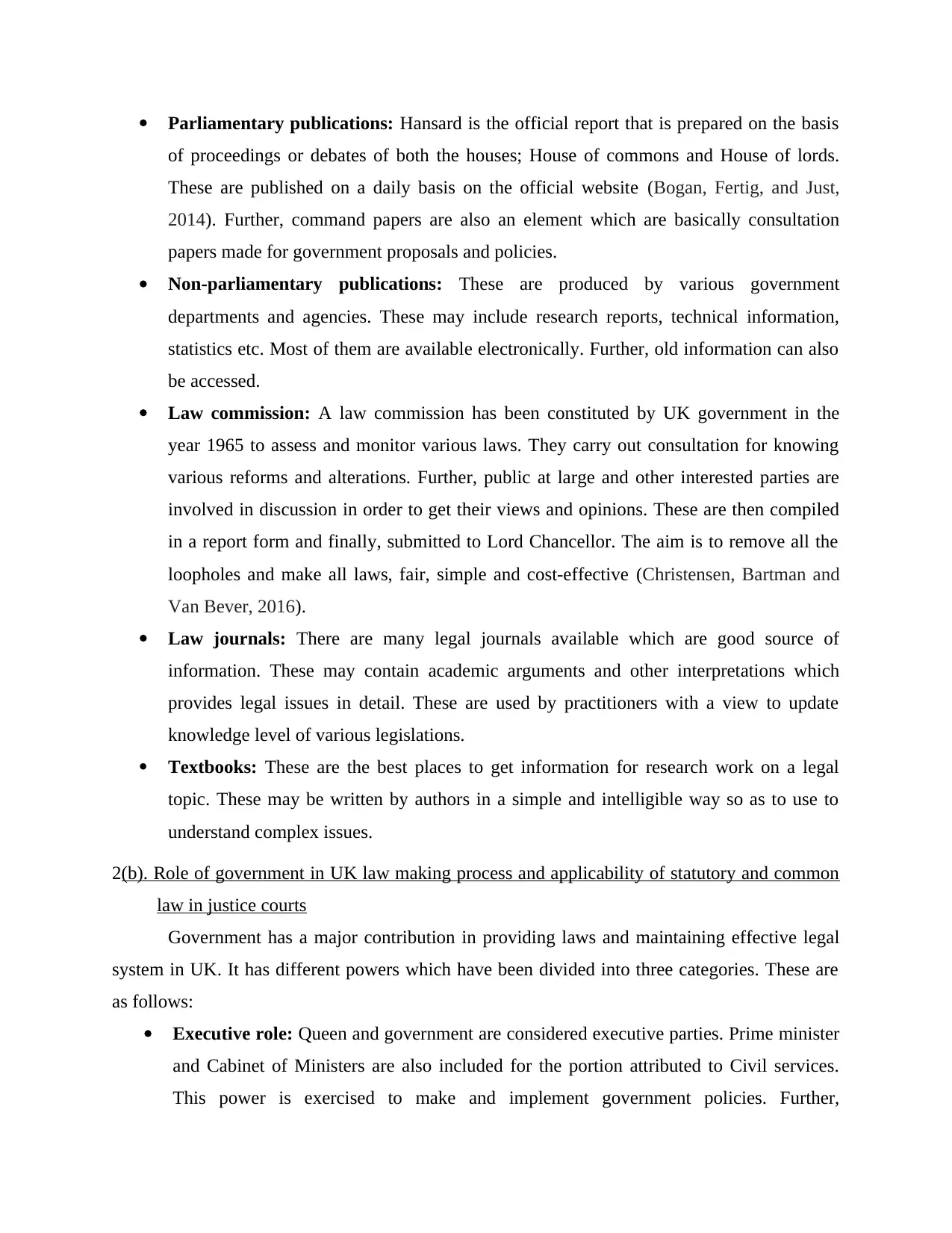
Parliamentary publications: Hansard is the official report that is prepared on the basis
of proceedings or debates of both the houses; House of commons and House of lords.
These are published on a daily basis on the official website (Bogan, Fertig, and Just,
2014). Further, command papers are also an element which are basically consultation
papers made for government proposals and policies.
Non-parliamentary publications: These are produced by various government
departments and agencies. These may include research reports, technical information,
statistics etc. Most of them are available electronically. Further, old information can also
be accessed.
Law commission: A law commission has been constituted by UK government in the
year 1965 to assess and monitor various laws. They carry out consultation for knowing
various reforms and alterations. Further, public at large and other interested parties are
involved in discussion in order to get their views and opinions. These are then compiled
in a report form and finally, submitted to Lord Chancellor. The aim is to remove all the
loopholes and make all laws, fair, simple and cost-effective (Christensen, Bartman and
Van Bever, 2016).
Law journals: There are many legal journals available which are good source of
information. These may contain academic arguments and other interpretations which
provides legal issues in detail. These are used by practitioners with a view to update
knowledge level of various legislations.
Textbooks: These are the best places to get information for research work on a legal
topic. These may be written by authors in a simple and intelligible way so as to use to
understand complex issues.
2(b). Role of government in UK law making process and applicability of statutory and common
law in justice courts
Government has a major contribution in providing laws and maintaining effective legal
system in UK. It has different powers which have been divided into three categories. These are
as follows:
Executive role: Queen and government are considered executive parties. Prime minister
and Cabinet of Ministers are also included for the portion attributed to Civil services.
This power is exercised to make and implement government policies. Further,
of proceedings or debates of both the houses; House of commons and House of lords.
These are published on a daily basis on the official website (Bogan, Fertig, and Just,
2014). Further, command papers are also an element which are basically consultation
papers made for government proposals and policies.
Non-parliamentary publications: These are produced by various government
departments and agencies. These may include research reports, technical information,
statistics etc. Most of them are available electronically. Further, old information can also
be accessed.
Law commission: A law commission has been constituted by UK government in the
year 1965 to assess and monitor various laws. They carry out consultation for knowing
various reforms and alterations. Further, public at large and other interested parties are
involved in discussion in order to get their views and opinions. These are then compiled
in a report form and finally, submitted to Lord Chancellor. The aim is to remove all the
loopholes and make all laws, fair, simple and cost-effective (Christensen, Bartman and
Van Bever, 2016).
Law journals: There are many legal journals available which are good source of
information. These may contain academic arguments and other interpretations which
provides legal issues in detail. These are used by practitioners with a view to update
knowledge level of various legislations.
Textbooks: These are the best places to get information for research work on a legal
topic. These may be written by authors in a simple and intelligible way so as to use to
understand complex issues.
2(b). Role of government in UK law making process and applicability of statutory and common
law in justice courts
Government has a major contribution in providing laws and maintaining effective legal
system in UK. It has different powers which have been divided into three categories. These are
as follows:
Executive role: Queen and government are considered executive parties. Prime minister
and Cabinet of Ministers are also included for the portion attributed to Civil services.
This power is exercised to make and implement government policies. Further,
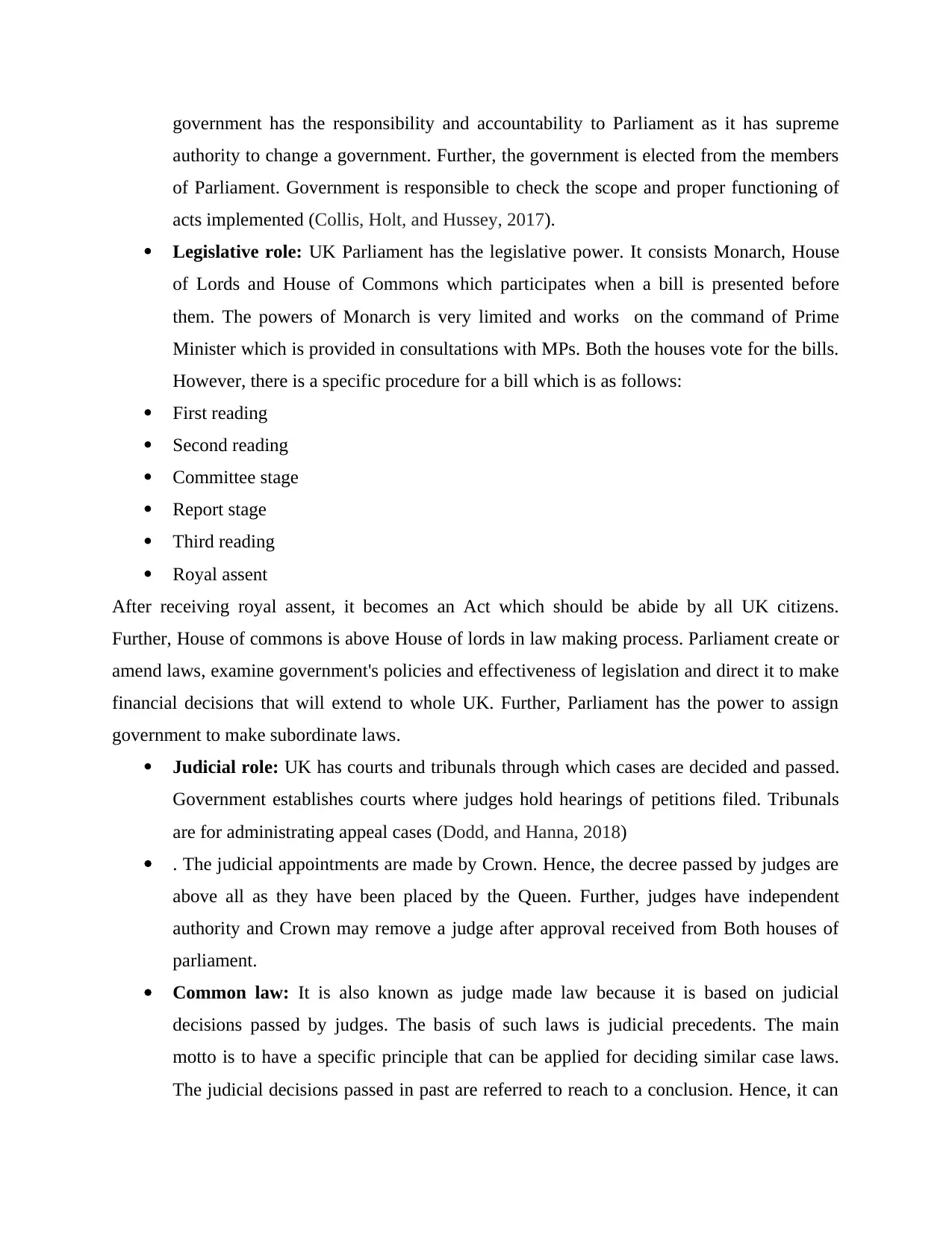
government has the responsibility and accountability to Parliament as it has supreme
authority to change a government. Further, the government is elected from the members
of Parliament. Government is responsible to check the scope and proper functioning of
acts implemented (Collis, Holt, and Hussey, 2017).
Legislative role: UK Parliament has the legislative power. It consists Monarch, House
of Lords and House of Commons which participates when a bill is presented before
them. The powers of Monarch is very limited and works on the command of Prime
Minister which is provided in consultations with MPs. Both the houses vote for the bills.
However, there is a specific procedure for a bill which is as follows:
First reading
Second reading
Committee stage
Report stage
Third reading
Royal assent
After receiving royal assent, it becomes an Act which should be abide by all UK citizens.
Further, House of commons is above House of lords in law making process. Parliament create or
amend laws, examine government's policies and effectiveness of legislation and direct it to make
financial decisions that will extend to whole UK. Further, Parliament has the power to assign
government to make subordinate laws.
Judicial role: UK has courts and tribunals through which cases are decided and passed.
Government establishes courts where judges hold hearings of petitions filed. Tribunals
are for administrating appeal cases (Dodd, and Hanna, 2018)
. The judicial appointments are made by Crown. Hence, the decree passed by judges are
above all as they have been placed by the Queen. Further, judges have independent
authority and Crown may remove a judge after approval received from Both houses of
parliament.
Common law: It is also known as judge made law because it is based on judicial
decisions passed by judges. The basis of such laws is judicial precedents. The main
motto is to have a specific principle that can be applied for deciding similar case laws.
The judicial decisions passed in past are referred to reach to a conclusion. Hence, it can
authority to change a government. Further, the government is elected from the members
of Parliament. Government is responsible to check the scope and proper functioning of
acts implemented (Collis, Holt, and Hussey, 2017).
Legislative role: UK Parliament has the legislative power. It consists Monarch, House
of Lords and House of Commons which participates when a bill is presented before
them. The powers of Monarch is very limited and works on the command of Prime
Minister which is provided in consultations with MPs. Both the houses vote for the bills.
However, there is a specific procedure for a bill which is as follows:
First reading
Second reading
Committee stage
Report stage
Third reading
Royal assent
After receiving royal assent, it becomes an Act which should be abide by all UK citizens.
Further, House of commons is above House of lords in law making process. Parliament create or
amend laws, examine government's policies and effectiveness of legislation and direct it to make
financial decisions that will extend to whole UK. Further, Parliament has the power to assign
government to make subordinate laws.
Judicial role: UK has courts and tribunals through which cases are decided and passed.
Government establishes courts where judges hold hearings of petitions filed. Tribunals
are for administrating appeal cases (Dodd, and Hanna, 2018)
. The judicial appointments are made by Crown. Hence, the decree passed by judges are
above all as they have been placed by the Queen. Further, judges have independent
authority and Crown may remove a judge after approval received from Both houses of
parliament.
Common law: It is also known as judge made law because it is based on judicial
decisions passed by judges. The basis of such laws is judicial precedents. The main
motto is to have a specific principle that can be applied for deciding similar case laws.
The judicial decisions passed in past are referred to reach to a conclusion. Hence, it can
⊘ This is a preview!⊘
Do you want full access?
Subscribe today to unlock all pages.

Trusted by 1+ million students worldwide
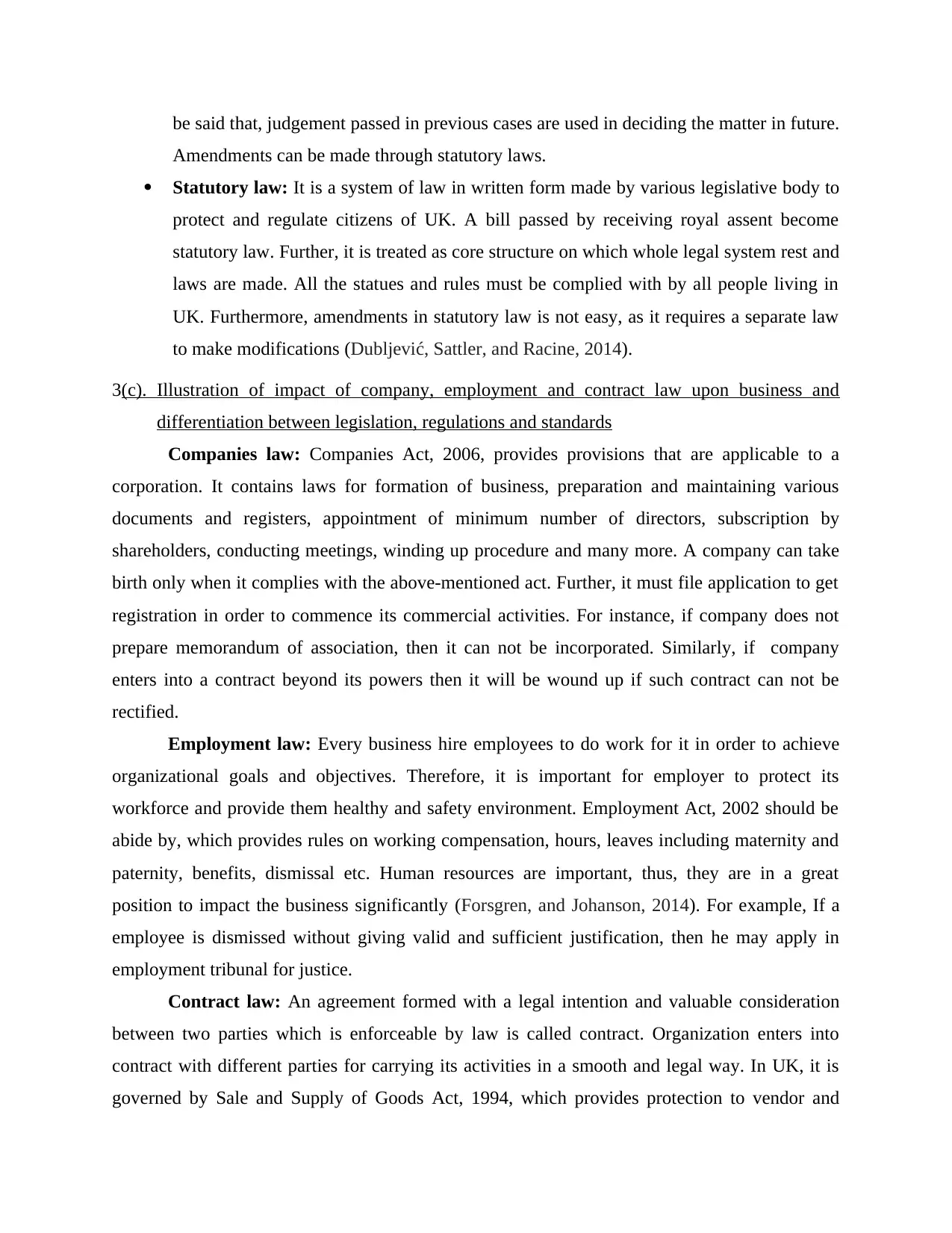
be said that, judgement passed in previous cases are used in deciding the matter in future.
Amendments can be made through statutory laws.
Statutory law: It is a system of law in written form made by various legislative body to
protect and regulate citizens of UK. A bill passed by receiving royal assent become
statutory law. Further, it is treated as core structure on which whole legal system rest and
laws are made. All the statues and rules must be complied with by all people living in
UK. Furthermore, amendments in statutory law is not easy, as it requires a separate law
to make modifications (Dubljević, Sattler, and Racine, 2014).
3(c). Illustration of impact of company, employment and contract law upon business and
differentiation between legislation, regulations and standards
Companies law: Companies Act, 2006, provides provisions that are applicable to a
corporation. It contains laws for formation of business, preparation and maintaining various
documents and registers, appointment of minimum number of directors, subscription by
shareholders, conducting meetings, winding up procedure and many more. A company can take
birth only when it complies with the above-mentioned act. Further, it must file application to get
registration in order to commence its commercial activities. For instance, if company does not
prepare memorandum of association, then it can not be incorporated. Similarly, if company
enters into a contract beyond its powers then it will be wound up if such contract can not be
rectified.
Employment law: Every business hire employees to do work for it in order to achieve
organizational goals and objectives. Therefore, it is important for employer to protect its
workforce and provide them healthy and safety environment. Employment Act, 2002 should be
abide by, which provides rules on working compensation, hours, leaves including maternity and
paternity, benefits, dismissal etc. Human resources are important, thus, they are in a great
position to impact the business significantly (Forsgren, and Johanson, 2014). For example, If a
employee is dismissed without giving valid and sufficient justification, then he may apply in
employment tribunal for justice.
Contract law: An agreement formed with a legal intention and valuable consideration
between two parties which is enforceable by law is called contract. Organization enters into
contract with different parties for carrying its activities in a smooth and legal way. In UK, it is
governed by Sale and Supply of Goods Act, 1994, which provides protection to vendor and
Amendments can be made through statutory laws.
Statutory law: It is a system of law in written form made by various legislative body to
protect and regulate citizens of UK. A bill passed by receiving royal assent become
statutory law. Further, it is treated as core structure on which whole legal system rest and
laws are made. All the statues and rules must be complied with by all people living in
UK. Furthermore, amendments in statutory law is not easy, as it requires a separate law
to make modifications (Dubljević, Sattler, and Racine, 2014).
3(c). Illustration of impact of company, employment and contract law upon business and
differentiation between legislation, regulations and standards
Companies law: Companies Act, 2006, provides provisions that are applicable to a
corporation. It contains laws for formation of business, preparation and maintaining various
documents and registers, appointment of minimum number of directors, subscription by
shareholders, conducting meetings, winding up procedure and many more. A company can take
birth only when it complies with the above-mentioned act. Further, it must file application to get
registration in order to commence its commercial activities. For instance, if company does not
prepare memorandum of association, then it can not be incorporated. Similarly, if company
enters into a contract beyond its powers then it will be wound up if such contract can not be
rectified.
Employment law: Every business hire employees to do work for it in order to achieve
organizational goals and objectives. Therefore, it is important for employer to protect its
workforce and provide them healthy and safety environment. Employment Act, 2002 should be
abide by, which provides rules on working compensation, hours, leaves including maternity and
paternity, benefits, dismissal etc. Human resources are important, thus, they are in a great
position to impact the business significantly (Forsgren, and Johanson, 2014). For example, If a
employee is dismissed without giving valid and sufficient justification, then he may apply in
employment tribunal for justice.
Contract law: An agreement formed with a legal intention and valuable consideration
between two parties which is enforceable by law is called contract. Organization enters into
contract with different parties for carrying its activities in a smooth and legal way. In UK, it is
governed by Sale and Supply of Goods Act, 1994, which provides protection to vendor and
Paraphrase This Document
Need a fresh take? Get an instant paraphrase of this document with our AI Paraphraser
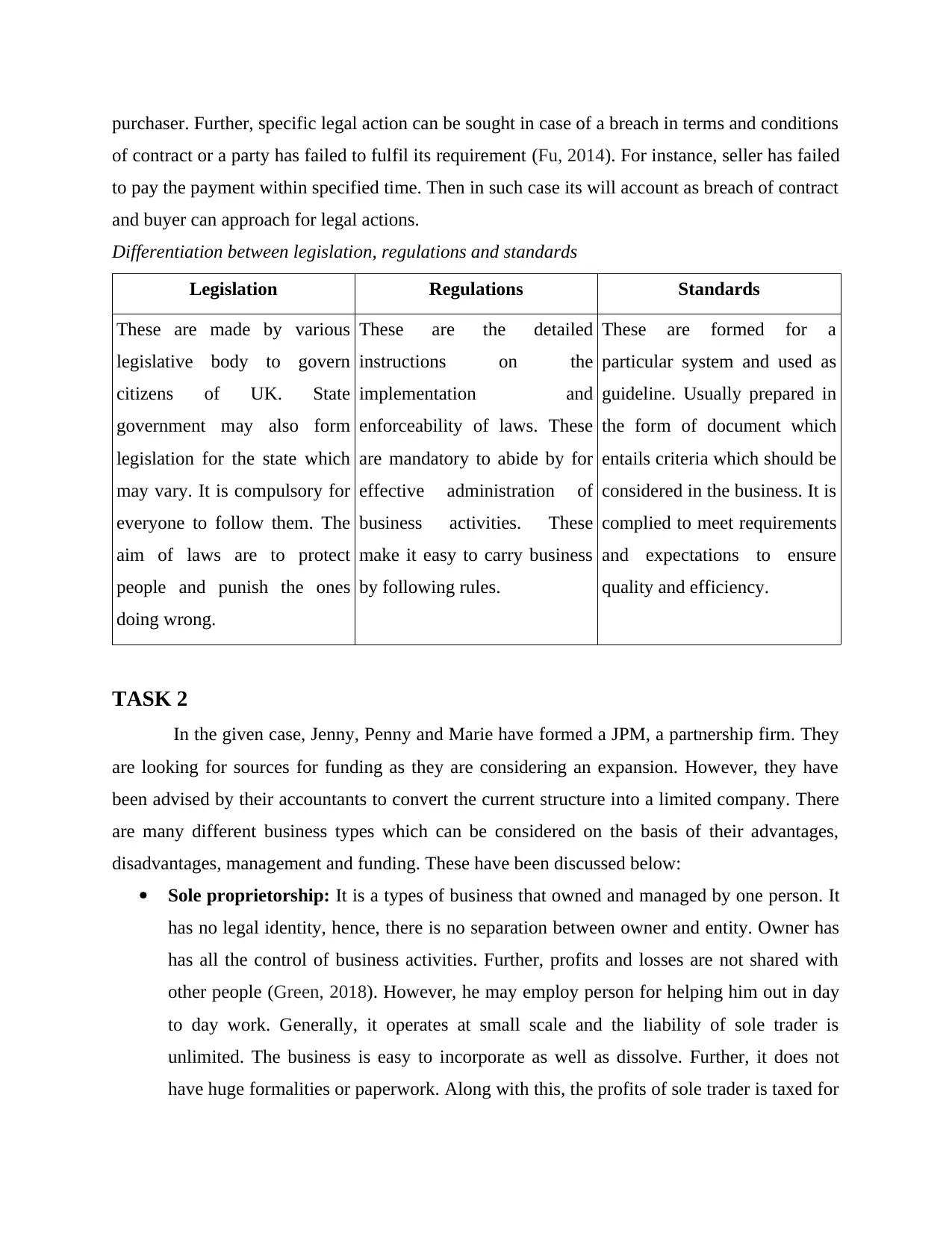
purchaser. Further, specific legal action can be sought in case of a breach in terms and conditions
of contract or a party has failed to fulfil its requirement (Fu, 2014). For instance, seller has failed
to pay the payment within specified time. Then in such case its will account as breach of contract
and buyer can approach for legal actions.
Differentiation between legislation, regulations and standards
Legislation Regulations Standards
These are made by various
legislative body to govern
citizens of UK. State
government may also form
legislation for the state which
may vary. It is compulsory for
everyone to follow them. The
aim of laws are to protect
people and punish the ones
doing wrong.
These are the detailed
instructions on the
implementation and
enforceability of laws. These
are mandatory to abide by for
effective administration of
business activities. These
make it easy to carry business
by following rules.
These are formed for a
particular system and used as
guideline. Usually prepared in
the form of document which
entails criteria which should be
considered in the business. It is
complied to meet requirements
and expectations to ensure
quality and efficiency.
TASK 2
In the given case, Jenny, Penny and Marie have formed a JPM, a partnership firm. They
are looking for sources for funding as they are considering an expansion. However, they have
been advised by their accountants to convert the current structure into a limited company. There
are many different business types which can be considered on the basis of their advantages,
disadvantages, management and funding. These have been discussed below:
Sole proprietorship: It is a types of business that owned and managed by one person. It
has no legal identity, hence, there is no separation between owner and entity. Owner has
has all the control of business activities. Further, profits and losses are not shared with
other people (Green, 2018). However, he may employ person for helping him out in day
to day work. Generally, it operates at small scale and the liability of sole trader is
unlimited. The business is easy to incorporate as well as dissolve. Further, it does not
have huge formalities or paperwork. Along with this, the profits of sole trader is taxed for
of contract or a party has failed to fulfil its requirement (Fu, 2014). For instance, seller has failed
to pay the payment within specified time. Then in such case its will account as breach of contract
and buyer can approach for legal actions.
Differentiation between legislation, regulations and standards
Legislation Regulations Standards
These are made by various
legislative body to govern
citizens of UK. State
government may also form
legislation for the state which
may vary. It is compulsory for
everyone to follow them. The
aim of laws are to protect
people and punish the ones
doing wrong.
These are the detailed
instructions on the
implementation and
enforceability of laws. These
are mandatory to abide by for
effective administration of
business activities. These
make it easy to carry business
by following rules.
These are formed for a
particular system and used as
guideline. Usually prepared in
the form of document which
entails criteria which should be
considered in the business. It is
complied to meet requirements
and expectations to ensure
quality and efficiency.
TASK 2
In the given case, Jenny, Penny and Marie have formed a JPM, a partnership firm. They
are looking for sources for funding as they are considering an expansion. However, they have
been advised by their accountants to convert the current structure into a limited company. There
are many different business types which can be considered on the basis of their advantages,
disadvantages, management and funding. These have been discussed below:
Sole proprietorship: It is a types of business that owned and managed by one person. It
has no legal identity, hence, there is no separation between owner and entity. Owner has
has all the control of business activities. Further, profits and losses are not shared with
other people (Green, 2018). However, he may employ person for helping him out in day
to day work. Generally, it operates at small scale and the liability of sole trader is
unlimited. The business is easy to incorporate as well as dissolve. Further, it does not
have huge formalities or paperwork. Along with this, the profits of sole trader is taxed for
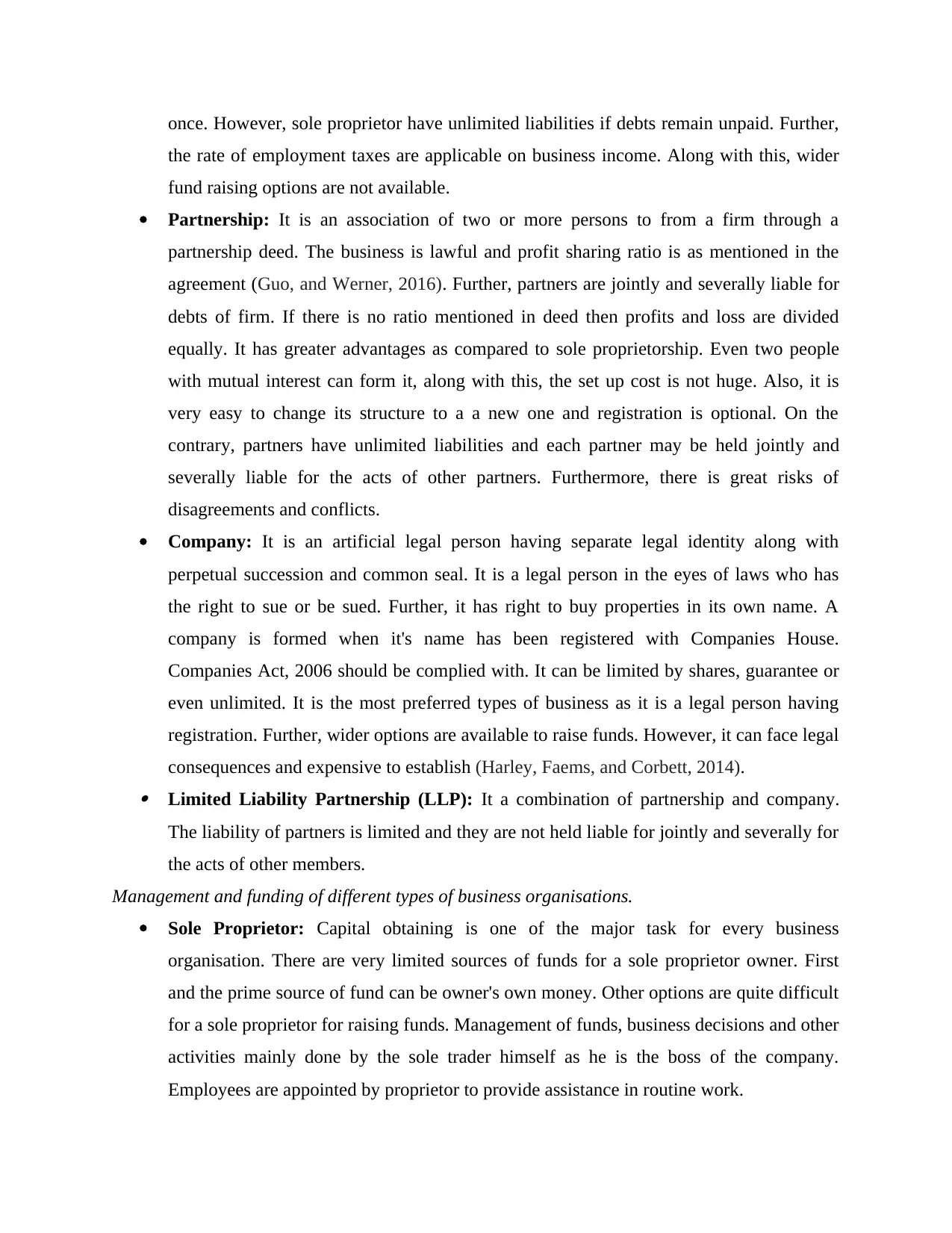
once. However, sole proprietor have unlimited liabilities if debts remain unpaid. Further,
the rate of employment taxes are applicable on business income. Along with this, wider
fund raising options are not available.
Partnership: It is an association of two or more persons to from a firm through a
partnership deed. The business is lawful and profit sharing ratio is as mentioned in the
agreement (Guo, and Werner, 2016). Further, partners are jointly and severally liable for
debts of firm. If there is no ratio mentioned in deed then profits and loss are divided
equally. It has greater advantages as compared to sole proprietorship. Even two people
with mutual interest can form it, along with this, the set up cost is not huge. Also, it is
very easy to change its structure to a a new one and registration is optional. On the
contrary, partners have unlimited liabilities and each partner may be held jointly and
severally liable for the acts of other partners. Furthermore, there is great risks of
disagreements and conflicts.
Company: It is an artificial legal person having separate legal identity along with
perpetual succession and common seal. It is a legal person in the eyes of laws who has
the right to sue or be sued. Further, it has right to buy properties in its own name. A
company is formed when it's name has been registered with Companies House.
Companies Act, 2006 should be complied with. It can be limited by shares, guarantee or
even unlimited. It is the most preferred types of business as it is a legal person having
registration. Further, wider options are available to raise funds. However, it can face legal
consequences and expensive to establish (Harley, Faems, and Corbett, 2014). Limited Liability Partnership (LLP): It a combination of partnership and company.
The liability of partners is limited and they are not held liable for jointly and severally for
the acts of other members.
Management and funding of different types of business organisations.
Sole Proprietor: Capital obtaining is one of the major task for every business
organisation. There are very limited sources of funds for a sole proprietor owner. First
and the prime source of fund can be owner's own money. Other options are quite difficult
for a sole proprietor for raising funds. Management of funds, business decisions and other
activities mainly done by the sole trader himself as he is the boss of the company.
Employees are appointed by proprietor to provide assistance in routine work.
the rate of employment taxes are applicable on business income. Along with this, wider
fund raising options are not available.
Partnership: It is an association of two or more persons to from a firm through a
partnership deed. The business is lawful and profit sharing ratio is as mentioned in the
agreement (Guo, and Werner, 2016). Further, partners are jointly and severally liable for
debts of firm. If there is no ratio mentioned in deed then profits and loss are divided
equally. It has greater advantages as compared to sole proprietorship. Even two people
with mutual interest can form it, along with this, the set up cost is not huge. Also, it is
very easy to change its structure to a a new one and registration is optional. On the
contrary, partners have unlimited liabilities and each partner may be held jointly and
severally liable for the acts of other partners. Furthermore, there is great risks of
disagreements and conflicts.
Company: It is an artificial legal person having separate legal identity along with
perpetual succession and common seal. It is a legal person in the eyes of laws who has
the right to sue or be sued. Further, it has right to buy properties in its own name. A
company is formed when it's name has been registered with Companies House.
Companies Act, 2006 should be complied with. It can be limited by shares, guarantee or
even unlimited. It is the most preferred types of business as it is a legal person having
registration. Further, wider options are available to raise funds. However, it can face legal
consequences and expensive to establish (Harley, Faems, and Corbett, 2014). Limited Liability Partnership (LLP): It a combination of partnership and company.
The liability of partners is limited and they are not held liable for jointly and severally for
the acts of other members.
Management and funding of different types of business organisations.
Sole Proprietor: Capital obtaining is one of the major task for every business
organisation. There are very limited sources of funds for a sole proprietor owner. First
and the prime source of fund can be owner's own money. Other options are quite difficult
for a sole proprietor for raising funds. Management of funds, business decisions and other
activities mainly done by the sole trader himself as he is the boss of the company.
Employees are appointed by proprietor to provide assistance in routine work.
⊘ This is a preview!⊘
Do you want full access?
Subscribe today to unlock all pages.

Trusted by 1+ million students worldwide
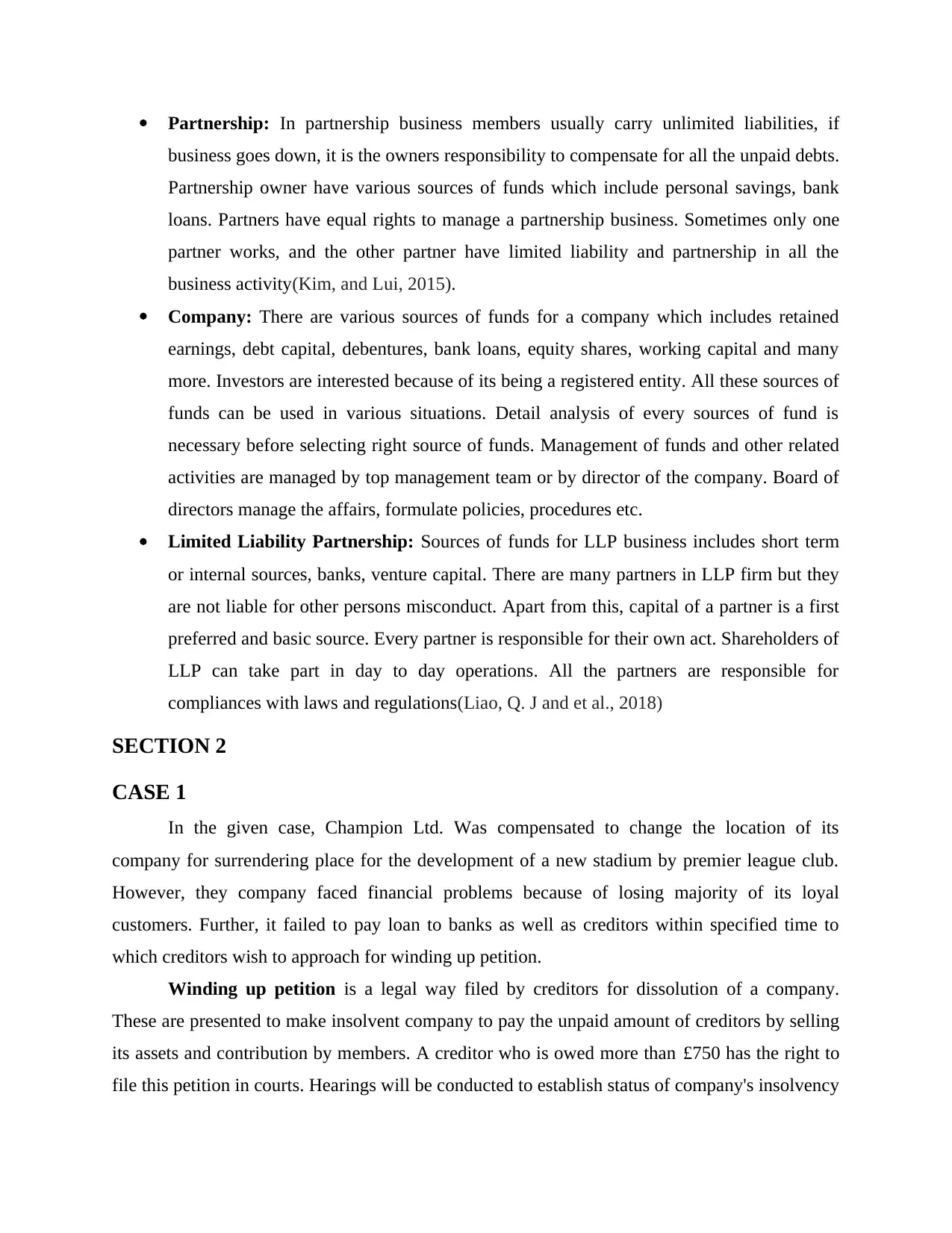
Partnership: In partnership business members usually carry unlimited liabilities, if
business goes down, it is the owners responsibility to compensate for all the unpaid debts.
Partnership owner have various sources of funds which include personal savings, bank
loans. Partners have equal rights to manage a partnership business. Sometimes only one
partner works, and the other partner have limited liability and partnership in all the
business activity(Kim, and Lui, 2015).
Company: There are various sources of funds for a company which includes retained
earnings, debt capital, debentures, bank loans, equity shares, working capital and many
more. Investors are interested because of its being a registered entity. All these sources of
funds can be used in various situations. Detail analysis of every sources of fund is
necessary before selecting right source of funds. Management of funds and other related
activities are managed by top management team or by director of the company. Board of
directors manage the affairs, formulate policies, procedures etc.
Limited Liability Partnership: Sources of funds for LLP business includes short term
or internal sources, banks, venture capital. There are many partners in LLP firm but they
are not liable for other persons misconduct. Apart from this, capital of a partner is a first
preferred and basic source. Every partner is responsible for their own act. Shareholders of
LLP can take part in day to day operations. All the partners are responsible for
compliances with laws and regulations(Liao, Q. J and et al., 2018)
SECTION 2
CASE 1
In the given case, Champion Ltd. Was compensated to change the location of its
company for surrendering place for the development of a new stadium by premier league club.
However, they company faced financial problems because of losing majority of its loyal
customers. Further, it failed to pay loan to banks as well as creditors within specified time to
which creditors wish to approach for winding up petition.
Winding up petition is a legal way filed by creditors for dissolution of a company.
These are presented to make insolvent company to pay the unpaid amount of creditors by selling
its assets and contribution by members. A creditor who is owed more than £750 has the right to
file this petition in courts. Hearings will be conducted to establish status of company's insolvency
business goes down, it is the owners responsibility to compensate for all the unpaid debts.
Partnership owner have various sources of funds which include personal savings, bank
loans. Partners have equal rights to manage a partnership business. Sometimes only one
partner works, and the other partner have limited liability and partnership in all the
business activity(Kim, and Lui, 2015).
Company: There are various sources of funds for a company which includes retained
earnings, debt capital, debentures, bank loans, equity shares, working capital and many
more. Investors are interested because of its being a registered entity. All these sources of
funds can be used in various situations. Detail analysis of every sources of fund is
necessary before selecting right source of funds. Management of funds and other related
activities are managed by top management team or by director of the company. Board of
directors manage the affairs, formulate policies, procedures etc.
Limited Liability Partnership: Sources of funds for LLP business includes short term
or internal sources, banks, venture capital. There are many partners in LLP firm but they
are not liable for other persons misconduct. Apart from this, capital of a partner is a first
preferred and basic source. Every partner is responsible for their own act. Shareholders of
LLP can take part in day to day operations. All the partners are responsible for
compliances with laws and regulations(Liao, Q. J and et al., 2018)
SECTION 2
CASE 1
In the given case, Champion Ltd. Was compensated to change the location of its
company for surrendering place for the development of a new stadium by premier league club.
However, they company faced financial problems because of losing majority of its loyal
customers. Further, it failed to pay loan to banks as well as creditors within specified time to
which creditors wish to approach for winding up petition.
Winding up petition is a legal way filed by creditors for dissolution of a company.
These are presented to make insolvent company to pay the unpaid amount of creditors by selling
its assets and contribution by members. A creditor who is owed more than £750 has the right to
file this petition in courts. Hearings will be conducted to establish status of company's insolvency
Paraphrase This Document
Need a fresh take? Get an instant paraphrase of this document with our AI Paraphraser
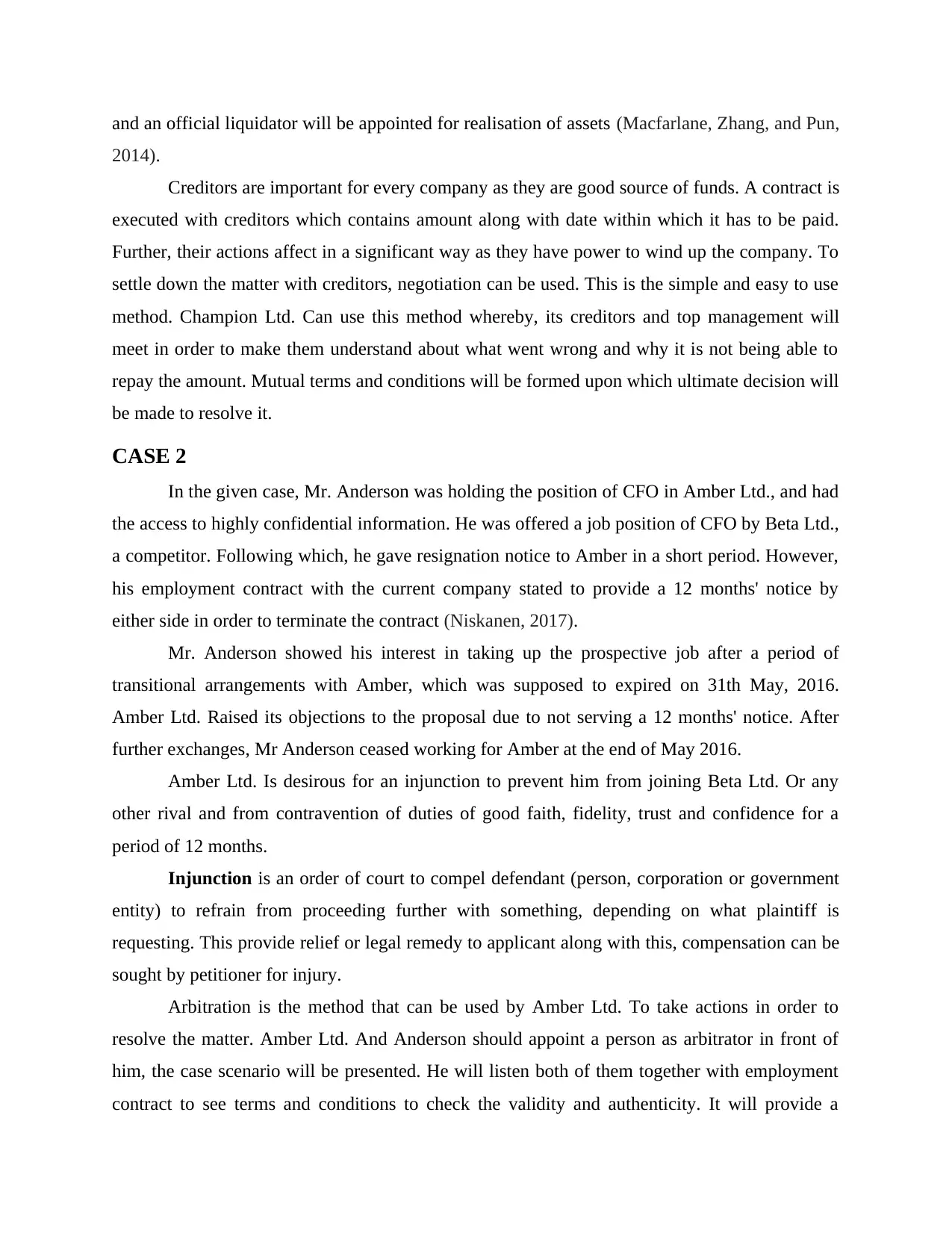
and an official liquidator will be appointed for realisation of assets (Macfarlane, Zhang, and Pun,
2014).
Creditors are important for every company as they are good source of funds. A contract is
executed with creditors which contains amount along with date within which it has to be paid.
Further, their actions affect in a significant way as they have power to wind up the company. To
settle down the matter with creditors, negotiation can be used. This is the simple and easy to use
method. Champion Ltd. Can use this method whereby, its creditors and top management will
meet in order to make them understand about what went wrong and why it is not being able to
repay the amount. Mutual terms and conditions will be formed upon which ultimate decision will
be made to resolve it.
CASE 2
In the given case, Mr. Anderson was holding the position of CFO in Amber Ltd., and had
the access to highly confidential information. He was offered a job position of CFO by Beta Ltd.,
a competitor. Following which, he gave resignation notice to Amber in a short period. However,
his employment contract with the current company stated to provide a 12 months' notice by
either side in order to terminate the contract (Niskanen, 2017).
Mr. Anderson showed his interest in taking up the prospective job after a period of
transitional arrangements with Amber, which was supposed to expired on 31th May, 2016.
Amber Ltd. Raised its objections to the proposal due to not serving a 12 months' notice. After
further exchanges, Mr Anderson ceased working for Amber at the end of May 2016.
Amber Ltd. Is desirous for an injunction to prevent him from joining Beta Ltd. Or any
other rival and from contravention of duties of good faith, fidelity, trust and confidence for a
period of 12 months.
Injunction is an order of court to compel defendant (person, corporation or government
entity) to refrain from proceeding further with something, depending on what plaintiff is
requesting. This provide relief or legal remedy to applicant along with this, compensation can be
sought by petitioner for injury.
Arbitration is the method that can be used by Amber Ltd. To take actions in order to
resolve the matter. Amber Ltd. And Anderson should appoint a person as arbitrator in front of
him, the case scenario will be presented. He will listen both of them together with employment
contract to see terms and conditions to check the validity and authenticity. It will provide a
2014).
Creditors are important for every company as they are good source of funds. A contract is
executed with creditors which contains amount along with date within which it has to be paid.
Further, their actions affect in a significant way as they have power to wind up the company. To
settle down the matter with creditors, negotiation can be used. This is the simple and easy to use
method. Champion Ltd. Can use this method whereby, its creditors and top management will
meet in order to make them understand about what went wrong and why it is not being able to
repay the amount. Mutual terms and conditions will be formed upon which ultimate decision will
be made to resolve it.
CASE 2
In the given case, Mr. Anderson was holding the position of CFO in Amber Ltd., and had
the access to highly confidential information. He was offered a job position of CFO by Beta Ltd.,
a competitor. Following which, he gave resignation notice to Amber in a short period. However,
his employment contract with the current company stated to provide a 12 months' notice by
either side in order to terminate the contract (Niskanen, 2017).
Mr. Anderson showed his interest in taking up the prospective job after a period of
transitional arrangements with Amber, which was supposed to expired on 31th May, 2016.
Amber Ltd. Raised its objections to the proposal due to not serving a 12 months' notice. After
further exchanges, Mr Anderson ceased working for Amber at the end of May 2016.
Amber Ltd. Is desirous for an injunction to prevent him from joining Beta Ltd. Or any
other rival and from contravention of duties of good faith, fidelity, trust and confidence for a
period of 12 months.
Injunction is an order of court to compel defendant (person, corporation or government
entity) to refrain from proceeding further with something, depending on what plaintiff is
requesting. This provide relief or legal remedy to applicant along with this, compensation can be
sought by petitioner for injury.
Arbitration is the method that can be used by Amber Ltd. To take actions in order to
resolve the matter. Amber Ltd. And Anderson should appoint a person as arbitrator in front of
him, the case scenario will be presented. He will listen both of them together with employment
contract to see terms and conditions to check the validity and authenticity. It will provide a
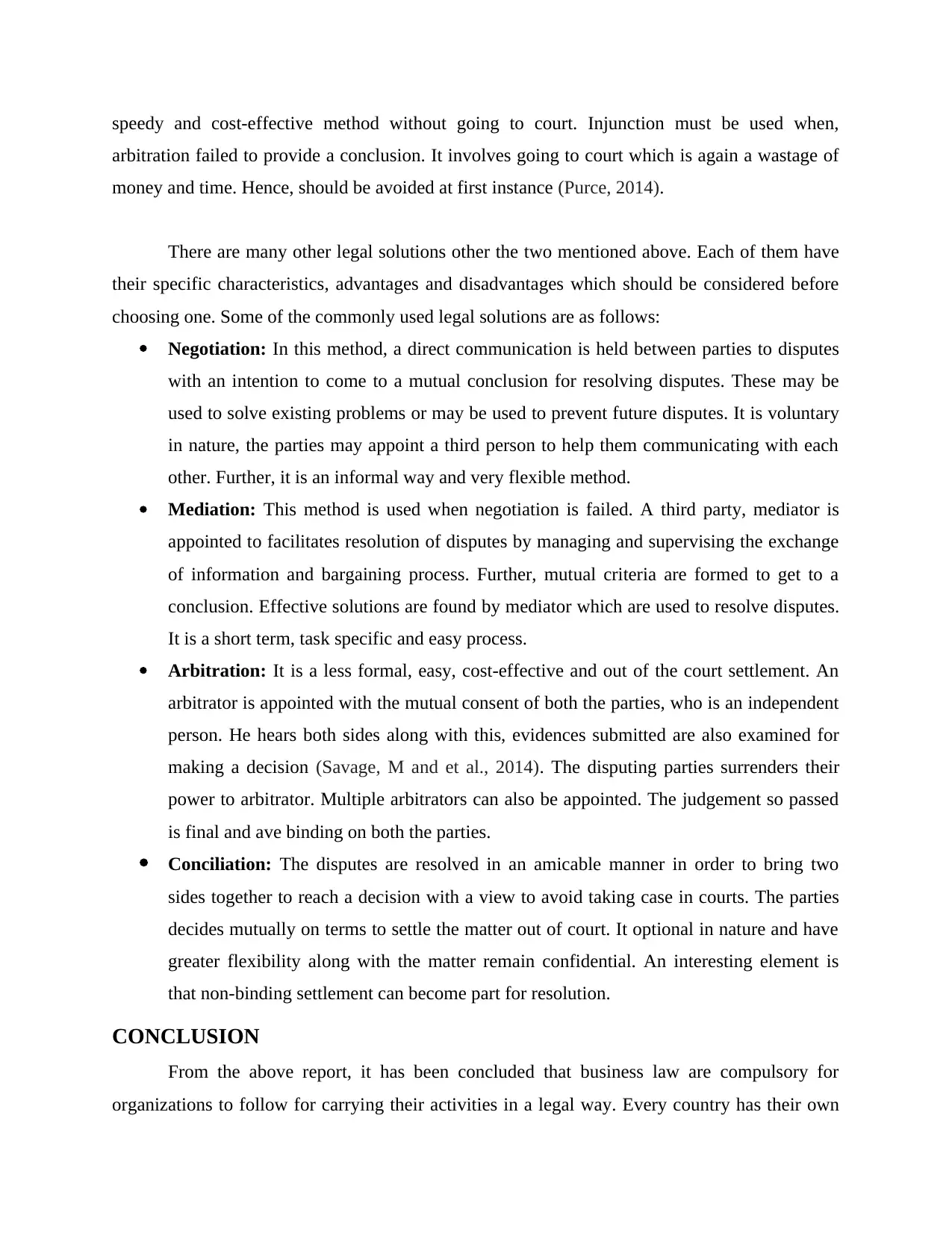
speedy and cost-effective method without going to court. Injunction must be used when,
arbitration failed to provide a conclusion. It involves going to court which is again a wastage of
money and time. Hence, should be avoided at first instance (Purce, 2014).
There are many other legal solutions other the two mentioned above. Each of them have
their specific characteristics, advantages and disadvantages which should be considered before
choosing one. Some of the commonly used legal solutions are as follows:
Negotiation: In this method, a direct communication is held between parties to disputes
with an intention to come to a mutual conclusion for resolving disputes. These may be
used to solve existing problems or may be used to prevent future disputes. It is voluntary
in nature, the parties may appoint a third person to help them communicating with each
other. Further, it is an informal way and very flexible method.
Mediation: This method is used when negotiation is failed. A third party, mediator is
appointed to facilitates resolution of disputes by managing and supervising the exchange
of information and bargaining process. Further, mutual criteria are formed to get to a
conclusion. Effective solutions are found by mediator which are used to resolve disputes.
It is a short term, task specific and easy process.
Arbitration: It is a less formal, easy, cost-effective and out of the court settlement. An
arbitrator is appointed with the mutual consent of both the parties, who is an independent
person. He hears both sides along with this, evidences submitted are also examined for
making a decision (Savage, M and et al., 2014). The disputing parties surrenders their
power to arbitrator. Multiple arbitrators can also be appointed. The judgement so passed
is final and ave binding on both the parties.
Conciliation: The disputes are resolved in an amicable manner in order to bring two
sides together to reach a decision with a view to avoid taking case in courts. The parties
decides mutually on terms to settle the matter out of court. It optional in nature and have
greater flexibility along with the matter remain confidential. An interesting element is
that non-binding settlement can become part for resolution.
CONCLUSION
From the above report, it has been concluded that business law are compulsory for
organizations to follow for carrying their activities in a legal way. Every country has their own
arbitration failed to provide a conclusion. It involves going to court which is again a wastage of
money and time. Hence, should be avoided at first instance (Purce, 2014).
There are many other legal solutions other the two mentioned above. Each of them have
their specific characteristics, advantages and disadvantages which should be considered before
choosing one. Some of the commonly used legal solutions are as follows:
Negotiation: In this method, a direct communication is held between parties to disputes
with an intention to come to a mutual conclusion for resolving disputes. These may be
used to solve existing problems or may be used to prevent future disputes. It is voluntary
in nature, the parties may appoint a third person to help them communicating with each
other. Further, it is an informal way and very flexible method.
Mediation: This method is used when negotiation is failed. A third party, mediator is
appointed to facilitates resolution of disputes by managing and supervising the exchange
of information and bargaining process. Further, mutual criteria are formed to get to a
conclusion. Effective solutions are found by mediator which are used to resolve disputes.
It is a short term, task specific and easy process.
Arbitration: It is a less formal, easy, cost-effective and out of the court settlement. An
arbitrator is appointed with the mutual consent of both the parties, who is an independent
person. He hears both sides along with this, evidences submitted are also examined for
making a decision (Savage, M and et al., 2014). The disputing parties surrenders their
power to arbitrator. Multiple arbitrators can also be appointed. The judgement so passed
is final and ave binding on both the parties.
Conciliation: The disputes are resolved in an amicable manner in order to bring two
sides together to reach a decision with a view to avoid taking case in courts. The parties
decides mutually on terms to settle the matter out of court. It optional in nature and have
greater flexibility along with the matter remain confidential. An interesting element is
that non-binding settlement can become part for resolution.
CONCLUSION
From the above report, it has been concluded that business law are compulsory for
organizations to follow for carrying their activities in a legal way. Every country has their own
⊘ This is a preview!⊘
Do you want full access?
Subscribe today to unlock all pages.

Trusted by 1+ million students worldwide
1 out of 15
Related Documents
Your All-in-One AI-Powered Toolkit for Academic Success.
+13062052269
info@desklib.com
Available 24*7 on WhatsApp / Email
![[object Object]](/_next/static/media/star-bottom.7253800d.svg)
Unlock your academic potential
Copyright © 2020–2026 A2Z Services. All Rights Reserved. Developed and managed by ZUCOL.




